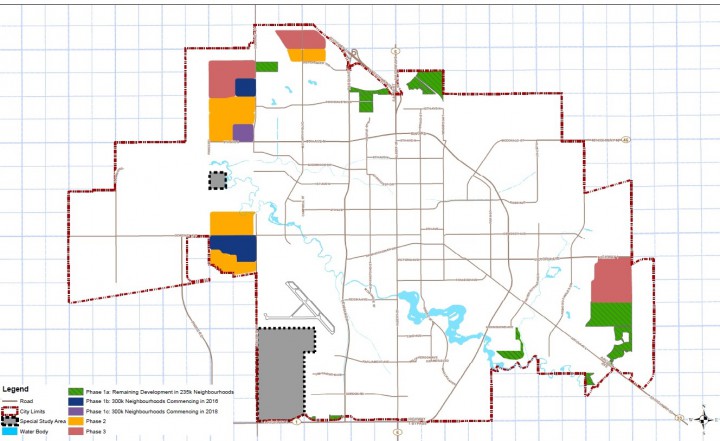REGINA – Growth will pay for growth. That’s what Mayor Michael Fougere said about the city’s new Servicing Agreement Fee (SAF) and Development Levy (DL).

The 25 year, $1.4-billion act as a guide for the city’s growth plan to a population of 300,000 people.
“We have a landmark decision here that we’ve been working on really in different forms since 2007 so this is our long-term financial framework for the next 25 years,” said Fougere.
The growth plan for new neighbourhoods is being split into three phases. Phase one consists mostly of areas already being developed under the plan for 235,000 people. The remainder of phase one and beyond are all part of the 300,000 person plan.
Developers will pay the bulk of the cost on a three-year phase-in plan. For neighbourhoods part of the already in-progress 235,000 person plan, developers will pay $346,000 per hectare in 2016 and that amount will climb to $451,000 per hectare in 2018.
Areas in the 300,000 population plan will start paying $380,000 per hectare and also reach $451,000 per hectare in 2018.

Get daily National news
The city says the SAF and DL will help it offset the cost of infrastructure for these new areas. New infrastructure that will be needed includes roads, water, sewage, and parks and recreation.
Taxpayers will pick up a portion of the infrastructure costs as well. Over the 25 year period, they are expected to pay approximately $210 million.
The city will review the funding of this plan annually to make sure it accounts for unforeseen expenses, inflation, and potential grants from the provincial and federal governments.
However, not all developers are satisfied with the plan.
Mark Geiger, owner of Skywood Development and Housing Ltd, argued that part of his proposed development should be moved from phase two to phase one.Geiger will eventually build the 220 acre Skywood subdivision in the northwest corner of the city, extending north of Diefenbaker Drive.
He said his firm has already spent a considerable amount of time and money on the subdivision’s detailed design, which is about 85 per cent complete.
“Not being in a phase one basically means we’ll walk away for 10 to 15 years by my estimate of this area being developed,” he argued. “So I feel it’s a little unfair that I would go through all of that to be basically shut down.”
Ward 10 Councillor Jerry Flegel tabled an amendment to include Geiger’s land in phase one, but it was ultimately defeated in a 9-1 vote.
“If the opportunity’s there for a developer to want to spend the money and put the resources forward, yes the city has to put some money forward as well, but we’re building the city not for just today,” he said after the meeting.








Comments